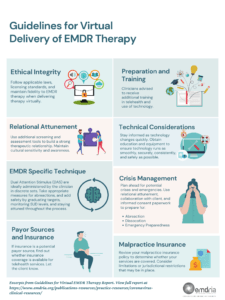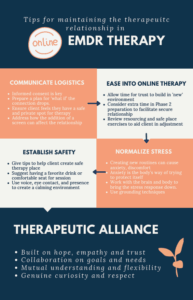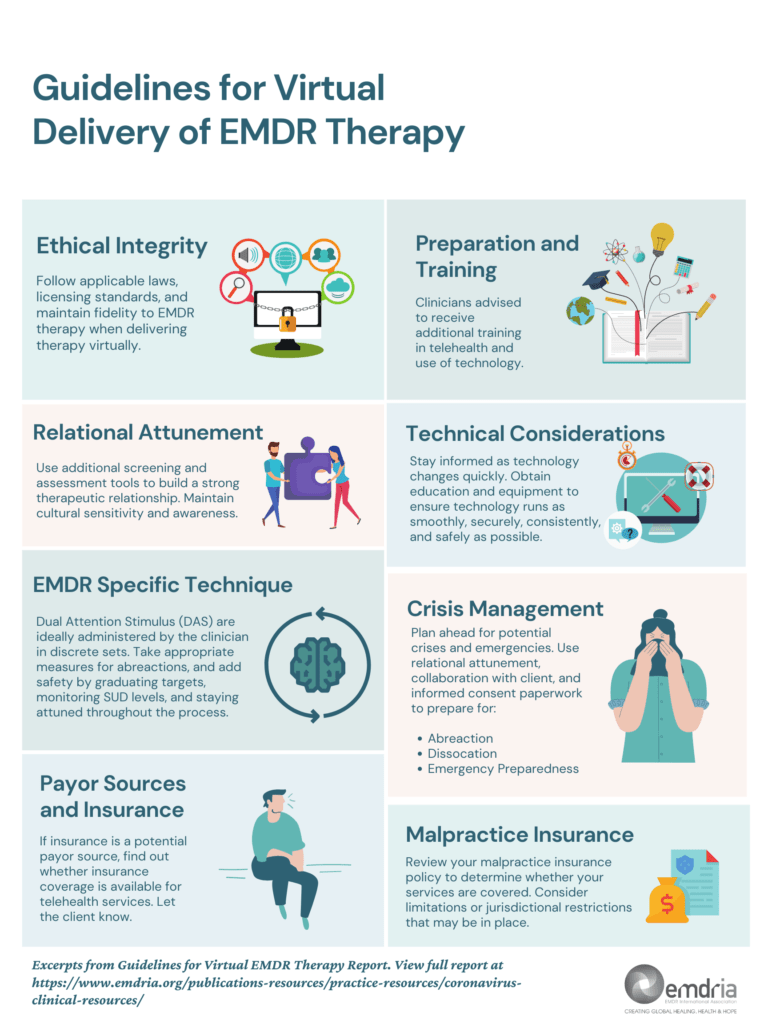Can EMDR Therapy be Done Online?
Pre-pandemic, this question was met with skepticism. Maybe a few therapists who were already digitally savvy were making online EMDR therapy work, but there was not much research to reinforce whether good outcomes were the norm. As the pandemic unfolded, more and more EMDR therapists began using EMDR therapy online, communicating best practices for use and effectiveness. Currently, due to the pandemic, online EMDR therapy has become routine for many EMDR therapists and clients.
Where Can I Find Resources Regarding Online EMDR Therapy?
EMDRIA has tracked this issue in several ways in hopes to provide access to resources:

Virtual Guidelines Poster
- Issuing the Guidelines for Virtual EMDR Therapy report and posting it publicly.
- Opening a Coronavirus online community for EMDRIA members to crowdsource best clinical practices (since renamed the Central Forum). This community can still be searched by topic to find many of these helpful conversations around using online EMDR therapy.
- Collecting clinical practice resources on the practical aspects of using online EMDR therapy.
- Tracking emerging peer-reviewed research as it comes out. See below.
- Listing EMDR dual attention/bilateral stimulation platforms.
- Featuring online EMDR therapy in the Summer 2020 Go With That Magazine, available to EMDRIA members.
Download Virtual Guidelines Poster
Download Online EMDR Therapy Relationship Infographic
Where Are We Now?
Now, two years later, we are still experiencing the ebbs and flows of COVID-19 outbreaks around the world.  Online EMDR therapy is common practice, and EMDR trainings, often virtual themselves, are teaching new EMDR therapists how to use online EMDR therapy. It is important to highlight in this culture of do-it-yourself online trends: even in online use, EMDR therapy is still best used within a therapeutic relationship with an EMDR trained and licensed mental health professional. This ensures that the client has the full support of a trained professional while working to resolve trauma symptoms and issues.
Online EMDR therapy is common practice, and EMDR trainings, often virtual themselves, are teaching new EMDR therapists how to use online EMDR therapy. It is important to highlight in this culture of do-it-yourself online trends: even in online use, EMDR therapy is still best used within a therapeutic relationship with an EMDR trained and licensed mental health professional. This ensures that the client has the full support of a trained professional while working to resolve trauma symptoms and issues.
What Does the Research Say?
Research is beginning to support what EMDR therapists are seeing in their practice: good clinical outcomes. Research to prove the effectiveness of EMDR therapy online is still coming out. Initial studies suggest that yes, EMDR therapy is not only a viable option for in-person therapy but has resulted in substantial mental health improvements. This 2-Minute Medicine article ‘Online Eye Movement Desensitization and Reprocessing Therapy may improve mental health’ and this Medical Dialogue’s article point to a recent study by McGowan et al, (2021), cited here.
Article:
McGowan, I. W., Fisher, N., Havens, J., & Proudlock, S. (2021). An evaluation of eye movement desensitization and reprocessing therapy delivered remotely during the Covid-19 pandemic. BMC Psychiatry, 21, 560. Open access: https://doi.org/10.1186/s12888-021-03571-x
Background
In addition to having a negative impact on the physical and emotional health of the population, the global Covid–19 pandemic has necessitated psychotherapists moving their practice to online environments. This service evaluation examines the efficacy of Eye Movement Desensitization and Reprocessing (EMDR) Therapy delivered via the internet.
Methods
A real–world service evaluation was conducted from a self–selecting group of EMDR therapists that subscribe to either a JISCMail discussion list or either the UK or All Ireland National EMDR Associations. Author designed questionnaires were used to gather information on the efficacy of EMDR delivered online as well as client and therapist characteristics.
Results
Thirty-three therapists provided efficacy data on a total of 93 patients. Statistically significant and clinically meaningful reductions were found in all four-psychometrics used both in adult and children and young people populations. Client outcome was not related to therapist experience.
Conclusions
EMDR delivered via the internet can be an effective treatment for clients experiencing mental health issues.
More Online EMDR Research Articles
Bates, A., Rushbrook, S., Shapiro, E., Grocott, M., & Cusack, R. (2020). CovEMERALD: Assessing the feasibility and preliminary effectiveness of remotely delivered eye movement desensitization and reprocessing following Covid-19 related critical illness: A structured summary of a study protocol for a randomized controlled trial. BioMedCentral, 21: 929. Open Access: https://doi.org/10.1186/s13063-020-04805-1
Bongaerts, H. Voorendonk, E. M., van Minnen, A., & de Jongh, A. (2021). Safety and effectiveness of intensive treatment for complex PTSD delivered via home-based telehealth. European Journal of Psychotraumatology, 12(1), 1860346. Open access: http://dx.doi.org/10.1080/20008198.2020.1860346
Bursnall, M., Thomas, B. D., Berntsson, H., Strong, E., Brayne, M. & Hind, D. (2022). Clinician and patient experience of internet-mediated eye movement desensitization and reprocessing therapy. Journal of Psychosocial Rehabilitation and Mental Health, 28. Open access: https://doi.org/10.1007/s40737-022-00260-0
Fisher, N. (2021). Using EMDR therapy to treat clients remotely. Journal of EMDR Practice and Research, 15(1), 73-84. http://dx.doi.org/10.1891/EMDR-D-20-00041
Lazzaroni, E., Invenizzi, R., Fogliato, E., Pagani, M., & Maslovaric, G. (2021). Coronavirus disease 2019 emergency and remote eye movement desensitization and reprocessing group therapy with adolescents and young adults: Overcoming lockdown with the butterfly hug. Frontiers in Psychology, Psychology for Clinical Settings, 701381. Open access: https://doi.org/10.3389/fpsyg.2021.701381
Lenferink, L. I. M., Meyerbroker, K., & Boelen, P. A. (2020). PTSD treatment in times of COVID-19: A systematic review of the effects of online EMDR. Psychiatry Research, 293:113438. Open access: https://doi.org/10.1016/j.psychres.2020.113438
Liou, H., Lane, C., Huang, C., Mookadam, M., Joseph, M., & Hecker DuVal, J. (2022). Eye movement desensitization and reprocessing in a primary care setting: Assessing utility and comparing efficacy of virtual versus in-person methods. Telemedicine and e-Health. https://doi.org/10.1089/tmj.2021.0454
Marotta-Walters, S.A., Jain, K., DeNardo, J., Kaur, P., & Kaligounder, S. (2018). A review of mobile applications for facilitating EMDR treatment of complex trauma and its comorbidities. Journal of EMDR Practice and Research, 12(1), 2-15. Open access: http://dx.doi.org/10.1891/1933-3196.12.1.2
Maxfield, L. (2021). Low-intensity interventions and EMDR therapy. Journal of EMDR Practice & Research, 15(2). Early View. http://dx.doi.org/10.1891/EMDR-D-21-00009
McGowan, I. W., Fisher, N., Havens, J., & Proudlock, S. (2021). An evaluation of eye movement desensitization and reprocessing therapy delivered remotely during the Covid-19 pandemic. BMC Psychiatry, 21, 560. Open access: https://doi.org/10.1186/s12888-021-03571-x
Mischler, C., Hofmann, A., Behnke, A., Matits, L., Lehnung, M., Varadarajan, S., Rojas, R., Kolassa, I-T., & Tumani, V. (2021). Therapists’ experiences with the effectiveness and feasibility of video conference-based eye movement desensitization and reprocessing. Frontiers in Psychology: Psychology for Clinical Settings, 748712. Open access: https://doi.org/10.3389/fpsyg.2021.748712
Moench, J., & Billsten, O. (2021). Randomized controlled trial: Self-care traumatic episode protocol (STEP), computerized EMDR treatment of COVID-19 related stress. Journal of EMDR Practice & Research, 15(2), 99-113. http://dx.doi.org/10.1891/EMDR-D-20-00047
Perri, R. L., Castelli, P., La Rosa, C., Zucchi, T., & Onofri, A. (2021). COVID-19, isolation, quarantine: on the efficacy of internet-based eye movement desensitization and reprocessing (EMDR) and cognitive-behavioral therapy (CBT) for ongoing trauma. Brain Sciences, 11(5), 579. Open access: https://doi.org/10.3390/brainsci11050579
Perez, M. C., Estevez, M. E., Becker, Y., Osorio, A., Jarero, I., & Givaudan, M. (2020). A multisite randomized controlled trial on the provision of the EMDR integrative group treatment protocol for ongoing traumatic stress remote to healthcare professionals working in hospitals during the Covid-19 pandemic. Psychology and Behavioral Science, 15(4), 555920. DOI: 10.19080/PBSIJ.2020.15.555920. Open access: https://juniperpublishers.com/pbsij/PBSIJ.MS.ID.555920.php
Spence, J., Titov, N., Johnson, L., Dear, B. F., Wootton, B., Terides, M., & Zou, J. (2013). Internet-delivered eye movement desensitization and reprocessing (iEMDR): An open trial [version 2; peer review: 2 approved]. F1000 Research, 2:79. Open access: https://doi.org/10.12688/f1000research.2-79.v2
Tarquinio, C., Brennstuhl, M., Rydberg, J. A., Bassan, F., Peter, L., Tarquinio, C. L., Auxemery, Y., Rotonda, C., & Tarquinio, P. (2020). EMDR in telemental health counseling for healthcare workers caring for COVID-19 patients: A pilot study. Issues in Mental Health Nursing published online. Open access: https://doi.org/10.1080/01612840.2020.1818014
Todder, D., & Kaplan, Z. (2007). Rapid eye movements for acute stress disorder using video conference communication. Telemedicine and e-Health, (13)4, 461-464. http://doi.org/10.1089/tmj.2006.0058
Winkler, O., Dhaliwal, R., Greenwhaw, A., O’Shea, K., Abba-Aji, A., Chima, C., Purdon, S. E., & Burback, L. (2021). Web-based eye movement desensitization and reprocessing for adults with suicidal ideation: Protocol for a randomized controlled trial. JMIR Research Protocols, 10(11): e30711. Open access: https://doi.org/10.2196/30711
Back to Focal Point Blog Homepage
Additional Resources
If you are a therapist interested in the EMDR training:
- Learn more about EMDR at the EMDRIA Library
- Learn more about EMDR Training
- Search for an EMDR Training Provider
- Check out our EMDR Training FAQ
If you are EMDR trained:
- Check out EMDRIA’s Let’s Talk EMDR Podcast
- Check out the EMDRIA blog, Focal Point
- Learn more about EMDRIA membership
- Search for Continuing Education opportunities
If you are an EMDRIA Member:
Date
February 11, 2022
Practice & Methods
Telehealth





